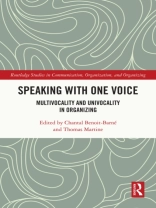This book explores the dynamics and challenges that underlie the ability of organizations to speak with one voice. Contributions by experienced and emerging scholars shed light on the nature and regulation of the communication processes whereby the many and diverse voices of a collective can unite, act, and speak as a distinct entity, thus contributing to its organizing.
By focusing on communicational events, whether in the context of for-profit and non-profit organizations, political protests or social movements, chapters guide the reader through the diverse manifestations and concrete ways of dealing with the imperative for organizations of all kinds to speak with one voice. In doing so, the book creates bridges between different perspectives with regard to the notion of voice and its significance for the study of organizing; between fields of study; and between theory and empirical research aimed at investigating organizing beyond the boundaries of the formal organization.
Offering a thorough and comprehensive investigation of the dynamics between multivocality and univocality in the organizing of various collectives, this book will be an important resource for scholars and students of organizational communication, management studies, media studies and rhetorical studies.












